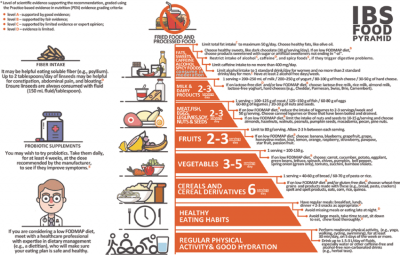IBS Diet Options and IBS-Focused Food Pyramid

It can feel like a revolving door sometimes, having Irritable Bowel Syndrome (IBS). You try something and it might work for a little bit and then the IBS symptoms start back up again.
Flare-ups aren’t your only issue though. It might be that you don’t even get into a state of feeling good and healthy in the first place. It feels like an uphill battle and there’s a point of “is it even worth it to keep trying this?”.
Syndromes are difficult to treat since you’re treating symptoms not a disease as a whole.
But that doesn’t mean there aren’t other options for you.
Here we’ve compiled a list of different diets that you can follow that have helped people with IBS in the past. The main thing to remember is that your goal isn’t to find a diet to be on for the rest of your life.
Diets are restrictive and don’t allow you to get all of the nutrients that you need to maintain a healthy body. So finding one that helps to alleviate IBS symptoms is good for a period of time, but your goal should be to get back to a normal diet with few exclusions.
The Problem with Restriction Diets
Since all of the diets included here are restriction diets, it’s best to get this information out front.
Restriction diets should not be used long term.
Some of the restrictions will be a good thing, like cutting out fatty, greasy, fried foods. However, some of the foods you’ll need to restrict are actually completely necessary to good health.
Not eating carbohydrates — which is one of the common restricted foods across all of these diets — means your body isn’t getting all of the fibers it needs.
Fiber helps to feed your good bacteria, allowing them to create more good bacteria. Good bacteria ensure your body remains in homeostasis by carrying out important tasks and fighting bad bacteria.
Bacterial diversity has been linked to a lower risk of autoimmune disorders and chronic diseases. Whereas low bacterial diversity is linked to a higher risk of both.
Supplementing restrictive diets with foods full of probiotics or prebiotics can be helpful to avoid malnutrition and still support good microbiome homeostasis.
Working alongside a registered dietitian (RD) — not a nutritionist — is the key to your success. RD’s ensure you get all of your vital nutrients to avoid malnutrition while still refraining from eating foods that trigger symptoms.
The Low-FODMAP Diet
The Low-FODMAP diet is the diet that is most commonly prescribed to newly diagnosed IBS patients.
FODMAPS means fermentable oligosaccharides, disaccharides, monosaccharides, and polyols. All of these are not-easily digestible carbohydrates.
Since these particular carbohydrates are difficult to digest, they start to cause IBS symptoms like bloating, gas, abdominal pains, and diarrhea or constipation.
Eliminating FODMAPs since they’re the most common trigger foods makes sense, right? Get rid of what’s causing the pain.
However, the foods that contain FODMAPs are generally fruits and vegetables.
The list of foods that you’ll eliminate in this diet is pretty endless. Foods like apples, garlic, cherries, onions, broccoli, milk, and watermelon are all high in FODMAPs.
Many IBS patients find success when using low-FODMAP diets since it does eliminate the trigger foods.
There seems to be more to the issue of IBS than carbohydrates. The problem is the type of bacteria they are feeding, not so much the carbohydrates themselves. You can read more about that on our website following this link.
It will also explain how Atrantil is able to help you eliminate these bacteria rather than your favorite foods.
The Gluten-Free Diet
Gluten is a protein molecule found in wheat, barley, and rye products.
Gluten sensitivity can often go hand in hand with IBS where the lines can be so blurred that it’s hard to know which condition someone actually has. Many IBS patients see success with the Gluten-Free diet as foods containing gluten also are high in FODMAPs.
Gluten-ridden foods include wheat, bread, cereal, pasta, and other grains. With the higher prevalence of gluten sensitivities in the world, it’s easier to find gluten-free options at your local grocery store.
This diet is a little less exclusive than the other ones we talk about, however, it’s still cutting out a high source of fiber in your diet.
The Ketogenic (Keto) Diet
The keto diet has gotten some serious attention lately. People get on this diet and drop weight fast. Which in and of itself, the weight loss is an attractive feature to this diet.
The keto diet is a high-fat/low-carb diet. The low-carb aspect is what allows it to be so successful with IBS patients.
The fact that it is high-fat might cause some issues for IBS patients who are triggered by fats.
Food sources like avocado and fatty meats can be a serious problem to anyone suffering from IBS which could mean this diet exacerbates rather than helps symptoms.
If you aren’t triggered by fats, then this diet is actually quite easy to follow. There is a surplus of new recipes and guidebooks out there for the keto diet since it’s been a focus for people trying to lose weight.
We do want to warn you though, that if you have any of the following diseases, the keto diet should be completely avoided unless otherwise instructed by your healthcare provider.
- Diabetes while taking insulin or other glycemic lowering agents
- Pancreatitis
- Liver failure
- Disorders of fat metabolism
- Primary carnitine deficiency
- Carnitine palmitoyltransferase deficiency
- Carnitine translocase deficiency
- Porphyrias
- Pyruvate kinase deficiency
The New IBS Food Pyramid: What You CAN Eat Instead of What You Can’t
Restrictive diets can be, well, restrictive. It’s stressful trying to figure out what is going to send you into a terrible fit of stomach pains and running to the bathroom.
In 2017, Cozma-Petrut et al. created a new way to look at IBS food suggestions. They created goals just like with the food pyramid we have all seen, but tailored them to be more IBS-friendly.

Cozma, Anamaria & Loghin, Felicia & Doina, Miere & Dumitraşcu, Dan. (2017). Diet in irritable bowel syndrome: What to recommend, not what to forbid to patients!. World Journal of Gastroenterology. 23. 3771. 10.3748/wjg.v23.i21.3771.
You’re going to want to start with the bottom and top tiers before heading onto the others. Limit the amount of fatty, fried, and processed foods first while focusing on healthy lifestyle factors like moderate exercise and increasing water intake.
Then work your way up from the bottom.
While goal amounts are the same for the regular food pyramid, there are suggestions on how to modify it for IBS.
- Choose lactose-free options if you struggle with lactose intolerance so you’re still getting vitamin D and calcium
- Choose healthier sweet options like dark chocolate instead of milk chocolate
- Choose boiled or canned legumes so you’re still getting the benefits of them with less problems
- If you struggle with being able to eat nuts, try eating almonds, walnuts, or pumpkin seeds as they are less irritating
- Pick fruits like strawberries, star fruit, bananas, and blueberries since they’re less likely to irritate your symptoms
- Incorporate vegetables like eggplant, zucchini, cucumber, and pumpkin into your routine
- If grains are your problem, choose wheat-free, spelt, oats, corn, and rice products instead to still get your grains
Make sure to ask your doctor about incorporating Atrantil into your new diet routine. It might be exactly what you need to speed up your recovery and reduce the amount of time you need to have a restrictive diet.
Atrantil helps in over 80% of the IBS cases. Atrantil could be exactly what you need, too.
Let us know if you’ve tried any of these diets and what has worked for you!
Resources:
- https://www.ncbi.nlm.nih.gov/pmc/articles/PMC6413021/pdf/nutrients-11-00373.pdf
- https://www.ncbi.nlm.nih.gov/pmc/articles/PMC2693479/pdf/nihms101786.pdf
- https://niddk.nih.gov/health-information/digestive-diseases/irritable-bowel-syndrome/eating-diet-nutrition
- https://www.ncbi.nlm.nih.gov/books/NBK499830/
- https://www.ncbi.nlm.nih.gov/pmc/articles/PMC5467063/pdf/WJG-23-3771.pdf